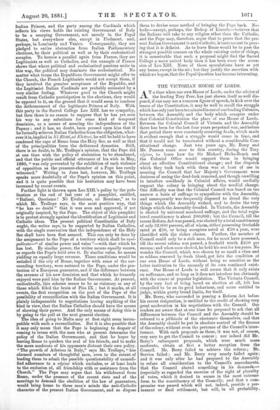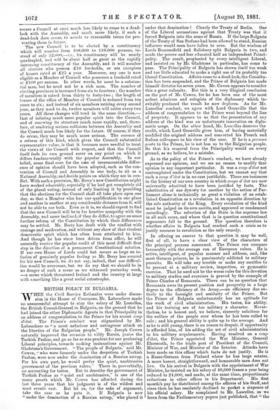THE VICTORIAN HOUSE OF LORDS.
AT a time when our own House of Lords, under the advice of the leading Tory Peer, has just shown itself so well dis- posed, if one may use a common figure of speech, to kick over the traces of the Constitution, it may be well to recall the struggle which has only just been terminated in one of our leading Colonies, between the Assembly and the body which occupies under that Colonial Constitution the place of our House of Lords. Between the Colonial Council of Victoria and the Assembly there has been for the last four years perpetual war, and before that period there were constantly recurring feuds, which made it evident enough that a struggle would come in time, and that it would not be terminated without a considerable Con- stitutional change. Just two years ago, Mr. Berry and Mr. Pearson came over to this country, during the Tory regime, to learn how far Sir Michael Hicks-Beach and the Colonial Office would support them in bringing about an effective Constitutional change ; and the dispatch which they took back with them was at least of use in assuring the Council that her Majesty's Government were desirous of seeing the dead-lock removed, and though unwilling to interfere needlessly in Colonial affairs, would cordially support the colony in bringing about the needful change. One difficulty was that the Colonial Council was based on too narrow a basis of suffrage to sympathize with the Assembly, and consequently was frequently disposed to dread the very things which the Assembly wished, and to desire the very things which the Assembly dreaded. In Victoria, the Assembly is elected by universal manhood suffrage, and the total regis- tered constituency is about 200,000; but the Council, till the recent Reform Act was passed, was elected by a total constituency of only 32,000 persons, all of whom, either possessing freeholds rated at £50, or being occupiers rated at £50 a year, were identified with the richer classes. Further, the member of Council could only be a rich man, for he must have possessed, till the recent reform was passed, a freehold worth £250 per annum ; and when once elected, he held his seat for ten years. No wonder the Council, which was chosen by so small a class and so seldom renewed by fresh blood, got into the condition of our own House of Lords, without being so sensitive as the latter institution to the anomaly of its own continued exist- ence. Our House of Lords is well aware that it only exists on sufferance, and so long as it does not interfere too obviously with the course of popular legislation. The Victoria Council, by the very fact of being based on election at all, felt less compelled to be on its good behaviour, and more entitled to judge, within pretty broad limits, for itself. Mr. Berry, who succeeded in passing a Reform Act before his recent resignation, is entitled to the credit of showing very great moderation in his negotiations with the Council. Our readers are aware that at one time he proposed to ask that all differences between the Council and the Assembly should be referred to a plebiscite of the electorate themselves, and that the Assembly should be put in absolute control of the finance of the colony, without even the pretence of the Council's inter- ference. With such proposals as these, it was not, of course, very easy to get the Council to concur ; nor indeed did Mr. Berry's subsequent proposals, which were much more moderate, obtain at first a better reception from the Council. Mr. Berry failed to achieve the reform ; Mr. Service failed ; and Mr. Berry very nearly failed again; and it was only after he had proposed to the Assembly to refuse all consideration to the Council's amendments, that the Council abated something in its demands,— (especially as regarded the exercise of the right of plurality of votes, which it desired to secure in the most extreme form to the constituency of the Council); and that a com- promise was passed which will not, indeed, provide a per- manent or final settlement, but will, in all probability,
secure a Council at once much less likely to come to a dead- lock with the Assembly, and much more likely, if such a dead-lock does occur, to accede to reasonable terms for pre- vcnting them in future. The new Council is to be elected by a constituency which will number from 108,000 to 110,000 persons, in- stead of only 32,000,—i.e., its constituency will be nearly quadrupled, and will be about half as great as the rapidly increasing constituency of the Assembly, and it will number all electors who possess £10 freeholds, or are cccupiers of houses rated at 25 a year. Moreover, any one is now eligible as a Member of Council who possesses a freehold rated at £100 per annum. In other words, he must be a substan- tial man, but he need not be a rich man. The number of electing provinces is increased from six to fourteen ; the number of members is raised from thirty to forty-two ; the length of tenure of the office of Member of Council is reduced from ten years to six ; and instead of six members retiring every second year, as they used to do, twelve members will retire every two years. All these changes will tend in the same direction,— that of infusing much more popular spirit into the Council, and of renewing its structure much more rapidly, and, there- fore, of rendering serious collisions between the Assembly and the Council much less likely for the future. Of course, if they do occur, they may be much more serious. The essence of a reform of this kind, which gives the Council substantial representative value, is that it becomes more needful to treat the views of the Council with respect, and that the Council itself feels its own ground surer on any point on which it differs fundamentally with the popular Assembly. In our belief, some final cure for the cassis of insurmountable differ- ence of opinion should have been adopted, such as the con- vention of Council and Assembly in one body, to sit as a National Assembly, and decide points on which they are in con- flict. With such a provision, Mr. Berry's new Constitution might have worked admirably, especially if he had got completely rid of the plural voting, instead of only limiting it by providing that the elections for the Council shall all take place upon one day, so that a Member who has one qualification in one place and another in another at any considerable distance from it, will mot be able to use both. Even as it is, we should expect to find that the new Council will be in far heartier sympathy with the Assembly, and more inclined, if they do differ, to agree on some 'further reform of the Constitution by which their differences may be settled. Mr. Berry has dealt with the conflict with courage and moderation, and without any show of that virulent democratic spirit which has often been attributed to him. And though he has since been driven from office, he will assuredly receive the popular credit of this most difficult first step in the direction of a permanent Constitutional solution. If our own House of Lords could but secure as large an in- fusion of genuinely popular feeling as Mr. Berry has secured for his new Council, we do not say, indeed, that our difficul- ties would be overcome, but we do say that we should be in no danger of such a scene as we witnessed yesterday week, —a scene which threatened Ireland and the country at large with something like a great social catastrophe.































 Previous page
Previous page